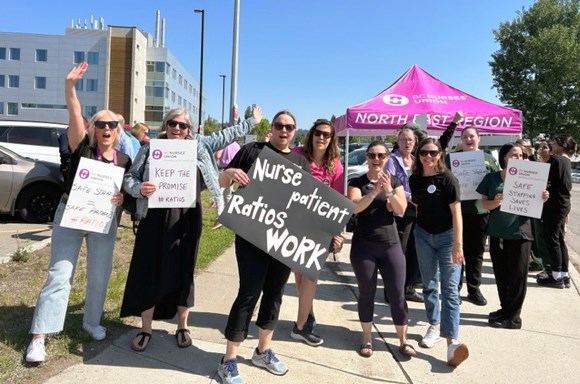Nursing staff shortages and overcapacity patient workloads at University Hospital of Northern B.C. in Prince George are chasing nurses away from their jobs, according to the B.C. Nurses Union.
It’s gotten so bad in the intensive care unit at UHNBC that intubated patients are being moved to the emergency room because there are not enough nurses in ICU to care for them.
In the past two years, at least 15 UHNBC emergency room nurses have either quit or have decided to take less stressful positions.
“These are seasoned, experienced nurses that have been in emergency a long time, they love the high rush and the adrenaline but they just can’t do it anymore, so they’re going to community jobs, nursing elsewhere,” said Danette Thomsen, northeast regional head of the BC Nurses Union.
“We need them to mentor the young ones.”
There are currently 50 vacant emergency room nursing positions in the Northern Health region. In the days leading up to the BC Nurses Union rally May 25 in front of the hospital, nurses working in the 17-patient capacity ER ward had an additional 18 patients to care for.
“It’s scary in there,” she said. “It’s triple your workload and it just takes a toll. The halls are packed, and that’s the thing for the nurses of the north. Kamloops has gotten help and Surrey has gotten help, from the government. Where the hell is our help? We need to come up with solutions.”
A few weeks ago, Thomsen brought her grandson to ER and had to wait outside in the parking lot for an hour before they got through to triage staff.
“I was standing there thinking, nobody’s checked to see if anybody’s having heart pain,” she said. “I stood there as a nurse thinking, I hope nobody drops here. Somebody is going to die.”
In outlying northern B.C. cities, nursing staff shortages are forcing ER departments to close. That’s happened recently in Dawson Creek, Fort St. James, Mackenzie, Tumbler Ridge, Burns Lake and now Chetwynd, which will be without ER care for the next three nights, forcing patients to travel to already overcapacity hospitals in Prince George, Fort St. John or Dawson Creek.
Thomsen says it’s not unusual for hospitalized seniors to be waiting days for treatment, lying in hallways on stretchers, and they develop bed sores as a result. Senior patients are spending up to a year waiting to be transferred a long-term care home. She knows of longterm care nurses caring for as many as 100 patients each during a night shift.
“We’re creating more issues than we’re solving,” said Thomsen. “We are seeing a ton of mental health patients. We need a mental health walk-in clinic or somewhere where they could be triaged separately or seen in a more therapeutic environment.”
As part of a new contract settlement announced March 31, which gives nurses a 12 per cent raise over three years, B.C. became the first province in Canada to adopt nursing staff ratios that will apply to all health authorities.
The new guidelines will staff nurses 1-to-1 for ventilated critical care patients, 1-to-2 for high acuity patients and mental health care, 1-to-3 for specialized care, 1-to-4 for in-patient and palliative care and 1-to-5 for rehabilitative care. Thousands of new nurses will have to be hired over the next three years to meet those ratios at a cost of $750 million and that boost to the workforce formula can’t come soon enough for Thomsen.
“We have wanted those for about 25 years. Both California and Australia have implemented ratios and it’s been really successful in changing the workforce and they’ve had much better retention I those areas,” said Thomsen.
“That will give us a fair playing ground. So much of what happens in the north is that there’s fewer nurses to take care of more patients compared to elsewhere in the province. We deserve the same quality of care in the north and our nurses want to deliver good quality care.”
Of the nearly 5,000 vacant nursing position in B.C, close to 400 are in the north. Some of those jobs will be filled with graduating students and some could come as a result of steps the province has taken to streamline recruiting of internationally-educated nurses.
This past year, for the first time Thomsen can recall, the College of New Caledonia had seats that went unfilled in its nursing program. In February 2022, the province announced a plan to add 602 new seats to the existing 2,000 annual capacity to train nurses but to ensure they get filled Thomsen says the province needs to step up efforts to incentivize students to pursue health-related careers.



